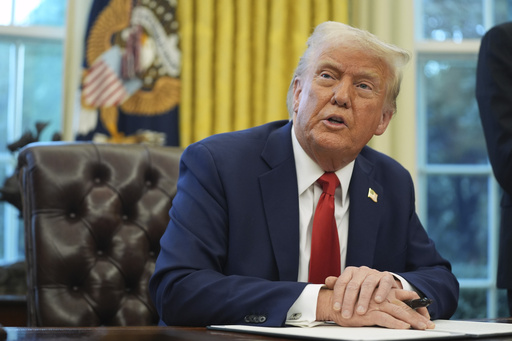
CAPE TOWN, South Africa — President Donald Trump announced his intention to withdraw all financial assistance to South Africa, citing alleged human rights abuses in the country. This declaration seems influenced by several unfounded assertions made by Elon Musk regarding the treatment of white individuals in South Africa, suggesting that the government may be inciting violence against them.
Trump expressed his concerns on Sunday by stating that “terrible things are happening in South Africa” and described the actions of its leadership as appalling, although he didn’t specify the issues at hand. According to Trump, there are grievances about land being confiscated, with some accusations hinting at even more severe actions occurring.
The President’s comments appear to reference a recent law passed in South Africa, which empowers the government to expropriate land under certain circumstances. This law aims to address the injustices stemming from the apartheid regime, during which Black individuals lost their land and were forced into segregated living conditions.
In response to Trump’s announcement, South African President Cyril Ramaphosa stated that the claims made by the U.S. leader are inaccurate, emphasizing that no land has been seized. Ramaphosa expressed a desire for dialogue with the Trump administration to clear up any misunderstandings regarding the law.
Musk has been vocal about South Africa’s governance, previously going as far as labeling it as a place where a “genocide” against white farmers is occurring, based on incidents of violence against them that have been reported for years. Experts, however, argue that these violent acts are part of a larger issue of crime in South Africa and do not constitute a genocide. The country experiences an alarming homicide rate, with a significant number of victims being people of color.
Musk further stirred contention by commenting on Ramaphosa’s official social media post, questioning the existence of what he described as “openly racist ownership laws.” This seemed to relate to the country’s affirmative action measures that seek to uplift historically marginalized groups. Musk’s company, Starlink, faced challenges in obtaining a license to operate in South Africa due to non-compliance with these affirmative action guidelines.
In the broader context of race relations in South Africa, there remain stark disparities. Even after the dismantling of apartheid over three decades ago, white citizens typically enjoy a significantly higher standard of living compared to their Black counterparts. A 2021 report by the South African Human Rights Commission revealed that a staggering 64% of Black individuals live in poverty, contrasting sharply with just 1% of white citizens. Land ownership also starkly reflects these inequalities; while representing only 7% of the population, white South Africans own approximately 70% of the land—a figure that, albeit reduced since apartheid, still indicates a considerable imbalance.
Furthermore, opposition to the new land expropriation law has emerged from South African civil organizations and political factions representing white interests, who seek to contest this statute in court, challenging provisions that allow for the confiscation of land without compensation.
Despite its historical challenges, South Africa is generally considered a stable democracy and does not experience the extreme racial tension often portrayed in the media.
As for Trump’s potential actions following his statements, he declared on his Truth Social platform that South Africa is “treating certain classes of people VERY BADLY,” without specifics, and threatened to cease all funding during an investigation. This move threatens around $400 million annually in assistance, vital for initiatives like the President’s Emergency Plan for AIDS Relief (PEPFAR), which is predominantly allocated to combat HIV/AIDS. The funding was already at risk due to Trump’s previous global aid freezes.
Additionally, there are concerns in South Africa that Trump may exclude the nation from the African Growth and Opportunity Act (AGOA), which allows tariff-free access for African countries to the U.S. market. Trump has already taken measures to impose tariffs on goods from other nations and recently mentioned delaying proposed tariffs on Mexico for an additional month.

